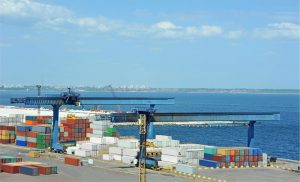The export price index rose 2.4 percent in the June 2020 quarter compared with a 0.2 percent fall in the March 2020 quarter. Import prices fell slightly, down 0.1 percent, boosting the merchandise terms of trade to a new high of 2.5 percent, Stats NZ said.
“Most dairy products increased in price over the quarter with global dairy trade auction prices recovering from a slump earlier in the year,” business prices manager Bryan Downes said in a statement.
Dairy export prices rose 4.1 percent in the June quarter, statistics showed.
“Export prices have been supported by favorable exchange rates after the New Zealand dollar fell as the COVID-19 pandemic spread around the world,” Downes said.
Forestry products export prices rose 11 percent in the June 2020 quarter, following a 3.3 percent fall last quarter. Forestry products export volumes fell 20 percent in the quarter, after forest logging stopped in April as logging was considered a non-essential business during the COVID-19 lockdown, he said.
“The domestic supply of logs for export was affected by efforts to stop the spread of COVID-19 in New Zealand while global supply constraints saw a spike in export prices over the same period,” Downes said.
Prices for imports fell 0.1 percent in the June 2020 quarter, reflecting a significant fall in imported fuel prices, partly offset by higher prices for cellphones, televisions, and laptops as well as animal fodder such as palm kernel, statistics showed.
Petroleum products import prices fell 35 percent in the quarter, the largest drop since the March 2009 quarter during the global financial crisis when prices fell 36 percent. Petroleum products volumes fell 42 percent in the June 2020 quarter, Stats NZ said.
“Crude oil stocks built up and imports fell after the border was closed to international visitors in March and air and road travel within New Zealand slowed due to COVID-19 restrictions,” Downes said.
Higher prices for cellphones, televisions, and laptops influenced a 4.7 percent rise to electrical machinery and apparatus, he said.
“Demand for such technology increased as more employees and students worked from home during the COVID-19 lockdown,” Downes said.
Overseas trade index prices for services exports rose 0.7 percent in the June 2020 quarter, with a rise of 16 percent for transportation services, its largest quarterly increase on record, he said.
“With fewer international passenger flights running after the border restrictions were imposed earlier in 2020, it became more expensive to deliver air freight to and from New Zealand,” he added.
The rise was partly offset by a fall in prices for travel services exports of 3.1 percent, its largest quarterly decrease on record, Stats NZ said.












